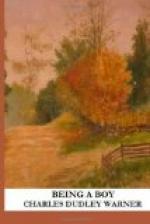And the farmer-boy is not without his sentiment and his secrets, though he has never been at a children’s party in his life, and, in fact, never has heard that children go into society when they are seven, and give regular wine-parties when they reach the ripe age of nine. But one of his regrets at having the summer school close is dimly connected with a little girl, whom he does not care much for, would a great deal rather play with a boy than with her at recess, —but whom he will not see again for some time,—a sweet little thing, who is very friendly with John, and with whom he has been known to exchange bits of candy wrapped up in paper, and for whom he cut in two his lead-pencil, and gave her half. At the last day of school she goes part way with John, and then he turns and goes a longer distance towards her home, so that it is late when he reaches his own. Is he late? He did n’t know he was late; he came straight home when school was dismissed, only going a little way home with Alice Linton to help her carry her books. In a box in his chamber, which he has lately put a padlock on, among fishhooks and lines and baitboxes, odd pieces of brass, twine, early sweet apples, pop-corn, beechnuts, and other articles of value, are some little billets-doux, fancifully folded, three-cornered or otherwise, and written, I will warrant, in red or beautifully blue ink. These little notes are parting gifts at the close of school, and John, no doubt, gave his own in exchange for them, though the writing was an immense labor, and the folding was a secret bought of another boy for a big piece of sweet flag-root baked in sugar, a delicacy which John used to carry in his pantaloons-pocket until his pocket was in such a state that putting his fingers into it was about as good as dipping them into the sugar-bowl at home. Each precious note contained a lock or curl of girl’s hair,—a rare collection of all colors, after John had been in school many terms, and had passed through a great many parting scenes,—black, brown, red, tow-color, and some that looked like spun gold and felt like silk. The sentiment contained in the notes was that which was common in the school, and expressed a melancholy foreboding of early death, and a touching desire to leave hair enough this side the grave to constitute a sort of strand of remembrance. With little variation, the poetry that made the hair precious was in the words, and, as a Cockney would say, set to the hair, following:




